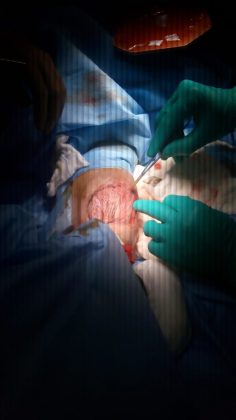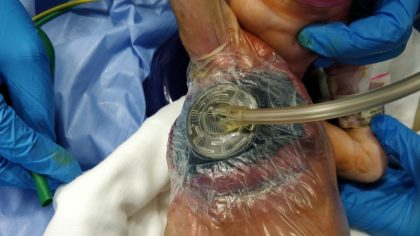- Home
- Editorial
- News
- Practice Guidelines
- Anesthesiology Guidelines
- Cancer Guidelines
- Cardiac Sciences Guidelines
- Critical Care Guidelines
- Dentistry Guidelines
- Dermatology Guidelines
- Diabetes and Endo Guidelines
- Diagnostics Guidelines
- ENT Guidelines
- Featured Practice Guidelines
- Gastroenterology Guidelines
- Geriatrics Guidelines
- Medicine Guidelines
- Nephrology Guidelines
- Neurosciences Guidelines
- Obs and Gynae Guidelines
- Ophthalmology Guidelines
- Orthopaedics Guidelines
- Paediatrics Guidelines
- Psychiatry Guidelines
- Pulmonology Guidelines
- Radiology Guidelines
- Surgery Guidelines
- Urology Guidelines
Bangalore doctors save newborn from rare flesh eating infection

Incredible-Bangalore doctors save newborn from a rare flesh-eating infection. A newborn who had been infected by Necrotising Fasciitis recently was miraculously saved by the combined effort of the doctors at Aster CMI Hospital, Bangalore.
Necrotizing fasciitis is a rapidly progressive inflammatory infection of the fascia, with secondary necrosis of the subcutaneous tissues. It has also been referred to as hemolytic streptococcal gangrene, Meleney ulcer, acute dermal gangrene, hospital gangrene, suppurative fasciitis, and synergistic necrotizing cellulitis.
Being eaten to death, less than a month - old newborn who had been infected by a superbug recently, was miraculously saved by the combined effort of the doctors at Aster CMI Hospital and active intervention by a Good Samaritan. Baby girl Rekha (name changed), born in a small town of Jharkhand was suffering from a rare life-threatening infection of the skin, Necrotising Fasciitis, also known as flesh eating disease with a high mortality rate. Team effort and multi-disciplinary management by Dr Sudheer KA, consultant neonatologist, Dr Madhusudan G, lead consultant plastic surgeon, Dr Chetan Ginigeri, consultant PICU and Dr Shilpa V, senior specialist at the department of paediatrics ensured the child’s survival. The baby will now be able to lead a normal life, thanks to the effectiveness of the medical procedures deployed in treatment.
Within five days of her birth, Rekha was noticed to have pus-filled vesicles on the skin over the right chest wall. Although she was administered with injectable antibiotics at a hospital in Jharkhand, the child’s condition continued to worsen with superficial infection eating away her skin and muscles underneath. The infection spilled into her bloodstream causing high-grade fever, poor feeding and respiratory distress, making her vulnerable to death and leaving the parents helpless. Owing to continuous degradation in the child’s condition, she was required to be referred for further management. This is when a close family friend, reached out to the paediatric team of Aster CMI to see if the doctors could help the child. He even agreed to foot the bill of family’s travel as the child’s family lacked financial resources. The doctors at the hospital came to her rescue. Immediately, the child was flown to Bangalore and was retrieved from the airport by the Aster paediatric team.

The case involved necrotising fasciitis of the right antero-lateral chest wall followed neonatal pustulosis, a group of disorders characterized by various forms of highly inflammatory skin condition resulting in large fluid-filled blister like areas seen in first four weeks of life. The child had an innocuous-looking superficial skin infection manifesting as small pus filled boils which then eroded into the skin and underlying fascia and muscle to cause local destruction of tissues. The bug is commonly known as MRSA - Methicillin-resistant Staphylococcus Aureus is a very potent bacteria which can cause life-threatening infections. The child was managed with appropriate antibiotics, wound debridement with vacuum-assisted closure (VAC) and skin grafting.
Dr Sudheer K A, Consultant Neonatologist, Aster CMI Bangalore, said: “After the initial assessment, we realised that the child was in a complicated condition. She was severely septic and the chest was being rapidly eaten away leaving a gaping defect over the skin which would definitely leave a scar. We had to quickly address three issues – control bloodstream infection, debride and remove dead skin and flesh thereby controlling the source, and optimise wound care so that the baby girl did not have a gaping defect and scar over her chest wall.”
The child was given appropriate antibiotics after culture reports revealed presence of Methicillin-resistant Staphylococcus (MRSA) – a superbug which can cause life threatening infections. Dr Madhusudan G, Lead Consultant Plastic Surgeon at Aster CMI said, “We adopted a unique method of debridement followed by Vacuum Assisted Closure (VAC) for wound care. VAC dressing is an evolving mode of treatment in new-borns for necrotising fasciitis and other major wounds including post cardiac and abdominal surgical wounds. It has been proven to be safe in neonates with birth weight as low as 650 grams. Vacuum assisted dressing over the wound bed allows the arterioles to dilate, increasing the effectiveness of local circulation, promoting angiogenesis, which assists in the proliferation of granulation tissue and enhancing wound healing. Patients on VAC were seen to have early granulation and rapid wound healing compared to saline gauze dressing”.

After 14 days of IV antibiotics and negative pressure treatment, the baby was taken up for split skin grafting on the 26th day of her life (graft site: right thigh). She was monitored in the Paediatric Intensive Care Unit (PICU) for 24 hours postoperatively and was then shifted to her mother’s side.
The grafting was completely taken up at the wound site and epithelialisation, the process of covering wound with epithelial tissue was noted at the wound site and the graft site. The baby was discharged on the 10th post-operative day.
“Following the surgery, we advised the parents to moisturise the wound site twice daily with cream and gentle massaging of the same for the next four to six months. The girl will go on to live a normal life with minimal or no scaring to show for the turbulence she went through,” added Dr Shilpa V, Senior specialist, Department of Paediatrics, Aster CMI hospital.
Dr Chetan Ginigeri, Consultant PICU, Aster CMI Hospital said: “As her parents were from a financially less privileged background, we made use of crowd funding platform to raise Rs 7 lakh for this complex procedure and overall care. Left to themselves, the family would have continued treatment locally and the child would have succumbed to the deadly infection. The initiative by a friend, doctors and hospitals taking the ownership of medical, social and financial care made the treatment successful.”

Disclaimer: This site is primarily intended for healthcare professionals. Any content/information on this website does not replace the advice of medical and/or health professionals and should not be construed as medical/diagnostic advice/endorsement or prescription. Use of this site is subject to our terms of use, privacy policy, advertisement policy. © 2020 Minerva Medical Treatment Pvt Ltd